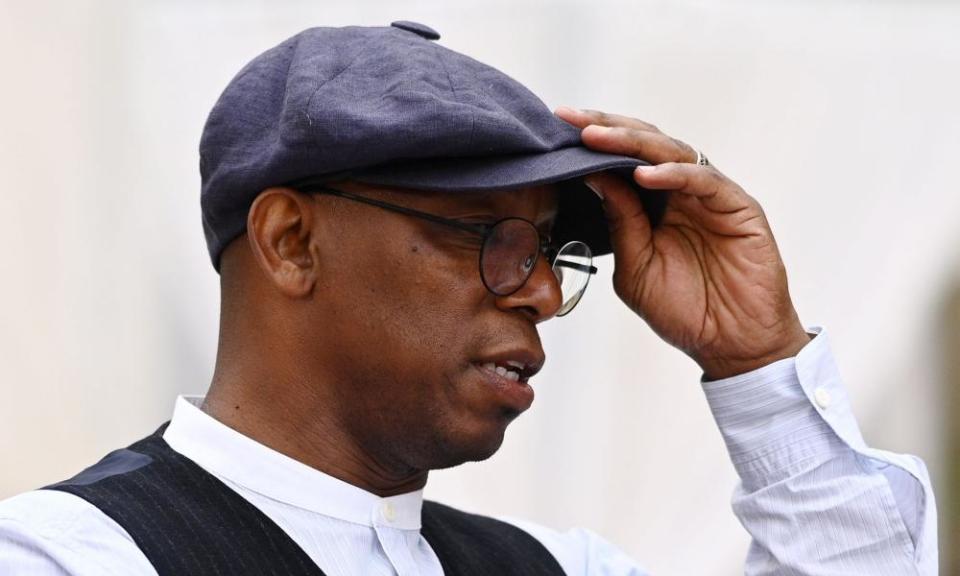Lewis Capaldi and Dave: Priti’s poor show can’t spoil Brits’ success stories

When it came to winning awards, at least, the Brits belonged to two men this year, in part because they didn’t really bother nominating many women.
You cannot begrudge the success of Dave, though, who won best album for Psychodrama. He managed to inspire a slew of increasingly woo-woo think-pieces after his powerful performance of Black, for which he wrote a new verse articulating his views on institutional racism in Britain. Priti Patel was wheeled out on Sky News to wag a finger at Dave for calling the prime minister a racist, telling Kay Burley that “it’s wrong to make judgments about an individual when you don’t know that particular individual”, which, when that individual is our elected leader, sure does put a spanner in the works of, ooh, I don’t know, democracy.
Less incendiary was Lewis Capaldi’s double win for best new artist and best song. When he picked up the latter for Someone You Love, he took time to clarify that the song is not about his ex-girlfriend, Paige Turley, currently appearing on Love Island. “It’s actually about my grandmother who sadly passed away a couple of years ago and I hope to god ITV don’t contact her to be on an ITV dating reality show,” he said. Capaldi has been explaining the song’s true meaning for a while, even before his ex took to reality television, but the Brits proved a large enough platform for the message finally to cut through.

For the most part, I am wary of an artist overexplaining what they were trying to say in a song, because when it is released it becomes a kind of partnership, a transaction and belongs to the listener as well as the musician. A song as objectively simple as Someone You Love struck a chord on such a scale because it serves as both story and template. You could put your own experience on to it, whether that was being miserable after being dumped or torn up by grief.
On occasion, finding out the intended meaning of a song can give it a new sheen. It wasn’t until Pete Shelley died that I learned the Buzzcocks’ Ever Fallen In Love (With Someone You Shouldn’t) was about a man, but then I went back to it with new ears. Finding out that Capaldi was singing about the loss of his grandmother made me like that song more, somehow. It’s all in the eye of the beholder or, indeed, ear of the listener, clearly. But Patel dismissing Dave’s views on her boss as “utter nonsense” surely says more about her as a listener than it does about him as a songwriter.
June Brown: Albert Square is a poorer place

Speaking to the podcast Distinct Nostalgia, June Brown revealed last week that she will no longer play Dot Cotton/Branning in EastEnders, effectively retiring the character after 35 years.
Dot last appeared in January, leaving a voicemail, saying that she had moved to Ireland, which will now become a euphemism for moving characters on. I can think of a few I’d like to move to Ireland myself. When presenter Rani Singh asked her if the soap had put her on a retainer, Brown, who is 93, replied: “I don’t want a retainer... I’ve left for good. I’ve sent myself to Ireland and that’s where she’ll stay. I’ve left EastEnders.”
She has been one of the soap’s most finest characters, quoting the Bible, smoking a fag and rolling up her sleeves in the launderette. I have always loved how American soaps are glossy, soft-focus and “aspirational”, while British soaps prefer to take a long, hard drag on the cigarette of life.
Whether accidentally ingesting tea made from “hemp”, calmly watching her dastardly son die of an overdose or commanding an entire episode with that unforgettably beautiful single-hander she delivered in 2008, Dot Cotton has been a national treasure. Thank you, June.
Ian Wright: big boys do cry. More power to them

Sometimes, a Desert Island Discs interview hits you in the gut. In terms of all time favourites, for me, it has to be Kathy Burke, not least because she chose to take Lady Gaga’s Bad Romance with her to the island.
I also adored Kirsty Young’s masterclass in taming Morrissey. But last weekend, Ian Wright talked through his life in one of the most emotional interviews I’ve heard in quite some time. My radio is in the kitchen, so it’s usually onions that get me going, but I was in bits by the time he started talking about the huge impact that his teacher Mr Pigden had had on his life.
A YouTube clip of Wright meeting Mr Pigden during a documentary about the footballer had previously gone viral; on Twitter, teachers talk of it boosting their morale. When he mentioned Mr Pigden again on Desert Island Discs, the clip of that part of the conversation also went viral. No wonder. Wright choked up as he explained how he was a naughty child, but Mr Pigden made him feel useful, and wanted, and heard. Wright said his teacher had been a pilot in the Second World War, and had flown over Buckingham Palace, yet he was more proud of the fact that Wright played for England. As he told this story, Wright’s voice cracked and all but disappeared. He apologised to listeners for getting so emotional. “I’ve turned into this bumbling, crying guy,” he said.
Host Lauren Laverne told him that listeners would be crying along with him and, by all accounts, that is exactly what they have been doing. For a man to express his emotions with such raw honesty is still rare, tragically so, in far too many cases. Wright did not need to apologise. Turning more of us into bumbling, crying guys would be a wonderful thing.
• Rebecca Nicholson is an Observer columnist


